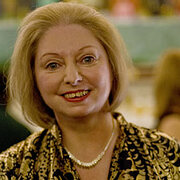Hilary Mantel (1952–2022)
Author of Wolf Hall
About the Author
Hilary Mantel was born in Glossop, Derbyshire, England on July 6, 1952. She studied law at the London School of Economics and Sheffield University. She worked as a social worker in Botswana for five years, followed by four years in Saudi Arabia. She returned to Britain in the mid-1980s. In 1987 she show more was awarded the Shiva Naipaul Memorial Prize for an article about Jeddah. She worked as a film critic for The Spectator from 1987 to 1991. She has written numerous books including Eight Months on Ghazzah Street, A Place of Greater Safety, A Change of Climate, The Giant, O'Brien, Giving up the Ghost: A Memoir, and Beyond Black. She has won several awards for her work including the Winifred Holtby Memorial Prize, the Cheltenham Prize and the Southern Arts Literature Prize for Fludd; the 1996 Hawthornden Prize for An Experiment in Love, the 2009 Man Booker Prize for Wolf Hall, and the 2012 Man Booker Prize for Bring up the Bodies. She made The New York Times Best Seller List with her title The Assassination of Margaret Thatcher. (Bowker Author Biography) show less
Image credit: Hilary Mantel - Photo by Sarah Lee
Series
Works by Hilary Mantel
The World of Wolf Hall: A Reading Guide to Hilary Mantel's Wolf Hall and Bring Up The Bodies (2019) 18 copies, 1 review
Hilary Mantel Collection 1 copy
Terminus 1 copy
Wölffe 1 copy
Mantel Hilary 1 copy
De tegenwoordige tijd 1 copy
The Hilary Mantel Collection 1 copy
Wintertrip & Iemands kind 1 copy
Cinderella in Autumn 1 copy
The Right to Life 1 copy
Associated Works
Religion and the Decline of Magic : Studies in popular beliefs in sixteenth- and seventeenth-century England (1971) — Introduction, some editions — 1,400 copies, 19 reviews
Literary Genius: 25 Classic Writers Who Define English & American Literature (2007) — Contributor — 92 copies, 2 reviews
Tagged
Common Knowledge
- Canonical name
- Mantel, Hilary
- Legal name
- Mantel, Hilary Mary Thompson
- Birthdate
- 1952-07-06
- Date of death
- 2022-09-22
- Gender
- female
- Nationality
- UK
- Birthplace
- Glossop, Derbyshire, England, UK
- Place of death
- Exeter, Devon, England
- Cause of death
- stroke
- Places of residence
- Hadfield, Derbyshire, England, UK
Romiley, Greater Manchester, England, UK
London, England, UK
Botswana
Jeddah, Saudi Arabia
Surrey, England, UK (show all 7)
Budleigh Salterton, Devon, England, UK - Education
- Harrytown Convent
London School of Economics (law)
University of Sheffield (LL.B|1973) - Occupations
- short story writer
film critic
social worker
novelist
essayist - Relationships
- McEwen, Gerald (husband)
- Organizations
- The Spectator
- Awards and honors
- Royal Society of Literature (fellow | 1990)
Order of the British Empire (CBE | 2006 | DBE | 2014)
Booker Prize (2009 | 2012)
David Cohen British Literature Prize (2013)
Kenyon Review Award for Literary Achievement (2016)
Shiva Naipaul Prize (1987) (show all 11)
Cheltenham Prize (1990)
Winifred Holtby Memorial Prize (1990)
National Book Critics Circle Award (2009)
Walter Scott Prize (2010)
British Academy President's Medal (2016) - Agent
- Bill Hamilton (AM Heath)
- Short biography
- Hilary Thompson was the eldest of three children in a Catholic English family of Irish descent. She took the surname of Mantel from her unofficial stepfather after her parents separated. After university, she worked as a social worker at a geriatric hospital and as a sales assistant in a department store. In 1972, she married Gerald McEwen, a geologist, and the couple later lived in Botswana and Saudi Arabia. She published a memoir of this time, "Someone to Disturb," in the London Review of Books. Her first novel, Every Day is Mother's Day, was published in 1985. Returning to England, Hilary Mantel became the film critic of The Spectator and a reviewer for a number of newspapers and magazines in Britain and the USA.
Members
Discussions
OT Hilary Mantel obituary in Folio Society Devotees (September 2022)
Wolf Hall and fiction vs. history in Reformation Era: History and Literature (December 2021)
Group Read: The Cromwell Trilogy: Bring Up The Bodies in Club Read 2021 (May 2021)
Group Read: The Cromwell Trilogy in Club Read 2021 (March 2021)
BRITISH AUTHOR CHALLENGE DECEMBER - MANTEL & WODEHOUSE in 75 Books Challenge for 2015 (December 2015)
The Smiler69/Chatterbox Tutored Read of "Wolf Hall": from June 1 until whenever we're done! in 75 Books Challenge for 2012 (December 2014)
Group Read: Bring Up the Bodies by Hilary Mantel (spoiler thread) in 75 Books Challenge for 2012 (November 2014)
Wolf Hall Tutored Read: Wherein Chatterbox undertakes to lead Miela through the tangled worlds of He in 75 Books Challenge for 2013 (August 2013)
GROUP READ - WOLF HALL June 2012 in The 12 in 12 Category Challenge (August 2012)
Bring Up the Bodies by Hilary Mantel in Booker Prize (July 2012)
Group Read: Bring Up the Bodies by Hilary Mantel (main thread) in 75 Books Challenge for 2012 (June 2012)
Beyond Black (no spoilers) in Orange January/July (January 2012)
WOLF HALL by Hilary Mantel in Orange January/July (October 2011)
Reviews
Lists
THE WAR ROOM (1)
Overdue Podcast (1)
Read These Too (1)
Big Jubilee List (1)
Wishlist (1)
Favorite Series (1)
United Kingdom (2)
A Novel Cure (2)
Unread books (2)
Five star books (2)
Female Author (4)
Booker Prize (4)
Backlisted (1)
Greatest Books (1)
Favourite Books (1)
Suggestions (1)
Morphy Pick! (1)
Shelf 101 (1)
To Read (1)
Awards
You May Also Like
Associated Authors
Statistics
- Works
- 58
- Also by
- 21
- Members
- 34,302
- Popularity
- #554
- Rating
- 4.0
- Reviews
- 1,495
- ISBNs
- 656
- Languages
- 24
- Favorited
- 110









































































